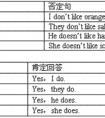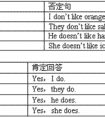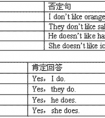句型转换。按要求变化句子。1. We usually go to school by bus. (对画线部分提问) ___________ do you usually ___________ to school? 2. My school is near the hosp-六年级英语
题文
| 句型转换。按要求变化句子。 |
|
1. We usually go to school by bus. (对画线部分提问) |
答案
| 1. How, go 2. Where, your 3. Does, work 4. Yes, does 5. I'm going to the library. (答案不唯一) |
据专家权威分析,试题“句型转换。按要求变化句子。1. We usually go to school by bus..”主要考查你对 疑问副词,物主代词,一般疑问句,特殊疑问句 等考点的理解。关于这些考点的“档案”如下:
疑问副词物主代词一般疑问句特殊疑问句
考点名称:疑问副词
- 疑问副词:
用来引导特殊疑问句,表示时间,地点,方式,原因等,常见的有:when,where,how,why等。
分类:
时间副词:now, then, yesterday, always, already, soon
地点副词:here, home, upstairs, nowhere, above, near, beyond
方式副词:多数是形容词加上ly构成的,和一些well, fast, quick, slow, hard, alone, straight, wide
在加词尾ly时要注意:
(1)辅音+le:simple→simply, gentle→gently,
(2)以ic结尾的词:classic→classical但是public→publicly
(3)以辅音读音是[i]的y结尾的词:easy→easily
(4)特例:full→fully, whole→wholly, true→truly
程度副词,连接副词,关系副词
much, enough, quite, hardly, almost, deeply
疑问副词连接副词,关系副词:
how,who,where - 疑问副词在句中的位置及用法举例:
由于疑问副词后接疑问句,因此这些副词一般都位于句首。例如:
How do you go to school? 你怎么去上学?
Why do you dislike the game? 为什么你不喜欢这个游戏? - 疑问代词和疑问副词区别:
1. 疑问代词做对陈述句的主语,宾语或定语提问,即做句子的主语,宾语或定语, 如:
what, who/ whom, whose.
eg. Who is talking ?
What can you see?
Whose shirt is this?
2.疑问副词对时间,地点,方式等状语提问,如:
when, where, how 等.
eg. When is your birthday?
Where are you going?
How do you know?
考点名称:物主代词
- 物主代词:
表示所有关系的代词叫做物主代词,也叫人称代词的所有格。物主代词分为名词性物主代词和形容词性物主代词两种。其中,形容词性物主代词后面需加名词;
名词性物主代词可直接作名词用,后面无需再加名词。
例:This is my book. / This book is mine.单数
复数
第一人称
第二人称
第三人称
第一人称
第二人称
第三人称
形容词性物主代词
my
your
his
her
its
our
your
their
名词性物主代词
mine
yours
his
her
its
ours
yours
theirs
汉语意思
我的
你的
他的
她的
它的
我们的
你们的
他(她它)们的
This is her dress. / This dress is hers. 物主代词的用法:
物主代词既有表示所属的作用又有指代作用,例如:
John had cut his finger; apparently there was a broken glass on his desk.
约翰割破了手指,显而易见,他桌子上有个破碎的玻璃杯。
物主代词有形容词性(my, your等)和名词性(mine, yours等)两种,形容词性的物主代词属于限定词。
名词性的物主代词在用法上相当于省略了中心名词的 --'s属格结构,例如:
Jack's cap 意为 The cap is Jack's.
His cap 意为 The cap is his.
名词性物主代词的句法功能:
a. 作主语,例如:
May I use your pen? Yours works better.
我可以用一用你的钢笔吗? 你的比我的好用。
b.作宾语,例如:
I love my motherland as much as you love yours.
我爱我的祖国就像你爱你的祖国一样深。
c.作介词宾语,例如:
You should interpret what I said in my sense of the word, not in yours.
你应当按我所用的词义去解释我说的话,而不能按你自己的意义去解释。
d.作主语补语,例如:
The life I have is yours. It's yours. It's yours. 我的生命属于你,属于你,属于你。
物主代词的意思是物品主人的代词。- 人称代词和物主代词:

![—— He'sneartheTVset (电视机).[ ]A.What'stheboydoing?B.Where'stheboy?C.Whoistheboy?-三年级英语](http://www.00-edu.com/d/file/ks/4/1/38/2019-08-19/smalla98d03e1cd1ad5f1eea83d4f5e418fe61566228470.jpg)
![_________ didyou_________?[ ]A. Where; wentB. Where; goC. What; went-六年级英语](http://www.00-edu.com/d/file/ks/4/1/38/2019-08-19/small4cca8e85fae1eda0cb114208d0da83c91566228121.jpg)



